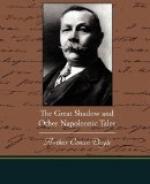“Pooh!” said I, not to be out-crowed by a foreigner. “If we had thirty thousand men on the line of the hill yonder, you would come to be very glad that you had your boats behind you.”
“On the line of the hill?” said he, with a flash of his eyes along the ridge. “Yes, if your man knew his business he would have his left about your house, his centre on Corriemuir, and his right over near the doctor’s house, with his tirailleurs pushed out thickly in front. His horse, of course, would try to cut us up as we deployed on the beach. But once let us form, and we should soon know what to do. There’s the weak point, there at the gap. I would sweep it with my guns, then roll in my cavalry, push the infantry on in grand columns, and that wing would find itself up in the air. Eh, Jack, where would your volunteers be?”
“Close at the heels of your hindmost man,” said I; and we both burst out into the hearty laugh with which such discussions usually ended.
Sometimes when he talked I thought he was joking, and at other times it was not quite so easy to say. I well remember one evening that summer, when he was sitting in the kitchen with my father, Jim, and me, after the women had gone to bed, he began about Scotland and its relation to England.
“You used to have your own king and your own laws made at Edinburgh,” said he. “Does it not fill you with rage and despair when you think that it all comes to you from London now?”
Jim took his pipe out of his mouth.
“It was we who put our king over the English; so if there’s any rage, it should have been over yonder,” said he.
This was clearly news to the stranger, and it silenced him for the moment.
“Well, but your laws are made down there, and surely that is not good,” he said at last.
“No, it would be well to have a Parliament back in Edinburgh,” said my father; “but I am kept so busy with the sheep that I have little enough time to think of such things.”
“It is for fine young men like you two to think of it,” said de Lapp. “When a country is injured, it is to its young men that it looks to avenge it.”
“Aye! the English take too much upon themselves sometimes,” said Jim.
“Well, if there are many of that way of thinking about, why should we not form them into battalions and march them upon London?” cried de Lapp.
“That would be a rare little picnic,” said I, laughing. “And who would lead us?”
He jumped up, bowing, with his hand on his heart, in his queer fashion.
“If you will allow me to have the honour!” he cried; and then seeing that we were all laughing, he began to laugh also, but I am sure that there was really no thought of a joke in his mind.




